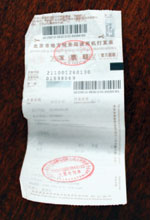
scratch and win
The Chinese government has come up with a highly imaginative system to get people to issue and ask for invoices. There’s a small box on every invoice you can scratch and maybe win a prize. This means that clients always ask for invoices because it means they have a chance to win a bit of money.
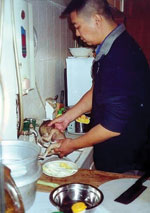
the legend of the foetus eaters
Apparently, an ancient gastronomic custom has become fashionable amongst rich people. Eating foetuses. It’s a false legend, although Chinese people don’t doubt it. There are many beliefs like that. For example, psychosis about children being stolen in supermarkets and shopping centres. There are many cases of children being stolen so, if you go to China, be careful about being too friendly with the children of people you don’t know!
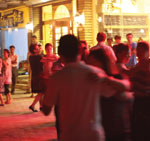
improvised dancing places
The people of Beijing love dancing. During the hot season, when it gets a bit cooler in the evening they set up places for dancing anywhere in the street. Life goes on, traffic doesn’t stop, the shops don’t close, but people get together anywhere, play music and dance. Just as we used to get together at town festivities, so now couples, young people who are learning how to dance, gossiping grandparents…all get together.
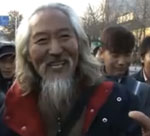
chinoccita
It’s thanks to Beijing resident and cameraman Roger Vicente that we’ve discovered Chinoccita. Dozens of people go to the doors of Beijing cinema and tv studios searching for an opportunity. If anyone needs an actor, all they have to do is go there and organise the casting right there, in the street. A few actors who are now famous got their first opportunities that way. One of them got her first chance and appeared in a Basque production.
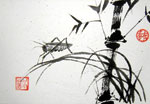
crickets
In spring and summer cricket sellers pop up everywhere in the streets of Beijing. Crickets’ song is closely connected with Chinese culture. At night they put a cricket next to their beds in a small cage: Chinese people like going to sleep to their sound. There is also a long tradition of cricket fights. Nowadays 10 million people make their living raising crickets. For 100 yuan (12 €)
you can take a singing cricket home, but for a fighting champion you’ll have to pay at least 8,000 yuan (1,000 €).
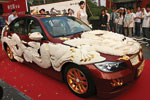
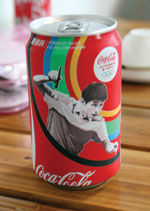
ping pong
They’ve won all the gold medals for ping pong at the London Olympics. Ping pong players are stars in China and you can see their photos of tins of Coca Cola. This game, wich is also an sport brings
people of all ages together in China. There are always ping pong tables in the parks between the skyscrapers.
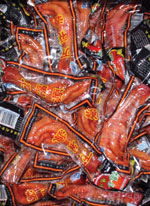
chinese appetizers
It’s said that the Chinese are capable of eating
anything. It’s not just that. They eat absolutely everything. Tripe, intestines, brains, cartilage and many other things which are no longer available in our markets are masterfully cooked in China. One discovery is donkey meat sandwiches. We wanted to eat a donkey’s dick, but didn’t have enough money. It was too expensive for us.
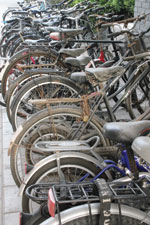
13 million
You can see Confucius, Buddha, Muhammed, Jesus
Christ and all the other gods on Chinese roads every day. And there’s no competition between them, there’s enough work for everyone. We’d say that with the number of vehicles there are and the anarchic way they’re driven they’ve got their work cut out. In Beijing, for instance, more than 13 million bicycles are ridden every day. But then, in the whole of China there are around 540 million bikes.
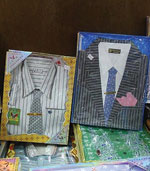
small fires
If you suddenly see somebody in a park setting fire to some bits of paper, don’t worry. There’s only a 0.01% chance that it’s a pyromaniac. When somebody dies in China, their relatives send them presents by
burning bits of paper with money, watches, cars and jewels printed on them. Ah, and there are cemeteries! We’ve seen them in Beijing. There are very fat worms on the lawns...
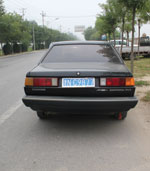
volkswagen santana
The Volkswagen Santana is an institution in China. They started making this model in 1982 in Shanghai. And it quickly became China’s best-loved car. It’s still in great demand, particularly amongst taxi drivers and a certain type of policeman. Even so, they’ve stopped making the iconic VW Santana to make way for new icons. Over 26 years in China
3,213,710 VW Santana have been sold.
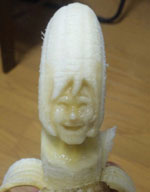
chinese bananas
That’s what Chinese people call Chinese people born in western countries. Many of them, although they now live in China, will always be Chinese bananas.
Why? Because they’re yellow on the outside but white inside. The Chinese, too, are pretty racist. Did you think that racism was an exclusive “gift”
for white people to use?
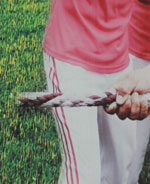
chinese tug o’ war
The old socialist posters and murals have almost disappeared. And, in the same way that Chinese socialism has changed, so has the way it’s represented. Many artists do amazing work at the government’s propaganda department. But we can’t say the same thing about the people who use Photoshop at the department. Look at this poster, for example.
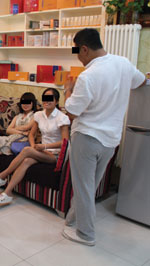
hairdressers
In central Beijing and in the tourist areas, hairdressers are probably the most common type of shop or business in the streets. Why’s that? Because as well as getting your hair cut you can also buy anything you want there. Although they look like hairdressers, they also offer other
services there too. What other services? Let’s
call it “Massage”...
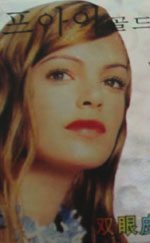
make your eyes round
Many girls in China, Japan and South Korea want to change the way their eyes are naturally. To put it one way, they want to make their eyes round and western. Having plastic surgery is one option, but
people who don’t want to go to such extremes use other tricks. The most widely used one is using a small, transparent latex plaster to pull the lower eyelid further down.
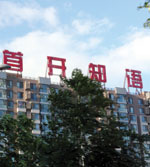
buildings
Many skyscrapers in Beijing have huge red letters at the top. They aren’t adverts, just the buildings’ or estates’ names. As so many skyscrapers and blocks are the same in any one city, creating something to differentiate between them becomes a necessity. And with the need for each
one to keep its own personality, the city’s
skyscape acquires its own character.
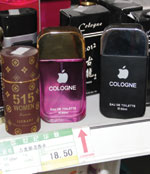
fakes
Chinese people prefer brands and genuine objects. The markets selling fakes in Beijing are full of long-noses (foreigners). There are two types of fakes: copies of well-known brands, and others which are of especial interest to us. Wait for it... “invented fakes”. Look at the photo and you’ll understand...


